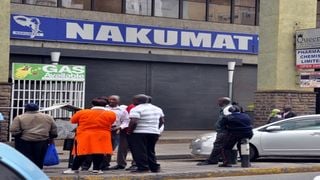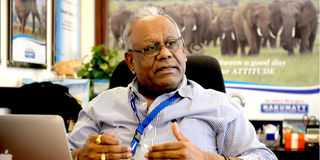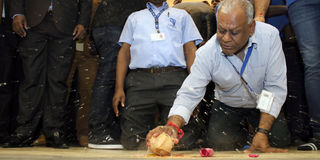
The Nakumatt Lifestyle branch in Hazina Towers in Nairobi in January 2018 when it was closed by the building's management due to rent arrears.
| Francis Nderitu | Nation Media GroupPremium
Murder as plunder and blunders send Nakumatt under
What you need to know:
- Police believe "retail guru" Atul Shah used money meant for suppliers to buy property abroad.
- The supermarket chain used Sh30 million life insurance payout for an assassinated auditor to fund its operations.
Nakumatt was not a house of saints. Here, the difference between conmen, workers, suppliers and entrepreneurs was fuzzy.
As Nakumatt owner Atul Shah rode on the perceived wave of success, his workers devised a way to steal Sh1 million from the till daily.
To outsiders, Nakumatt was the biggest retail chain in East and Central Africa.
Deep-pocketed businesspeople and firms were knocking on his door to buy into the chain but Atul turned them away.
Yet all that glittered was not gold. Atul seemed blinded by his drive to conquer the retail market. So impressive was the flow of money – after all, he was not paying suppliers – that he never noticed what his employees were doing. It was a simple crooked business: Whatever Atul sold, he pocketed. The rest was stolen by workers.
During the day, the employees would disconnect the devices that linked a branch to the headquarters and then take as much money as they could from what customers gave the tellers.
When the supermarket’s liquidator Peter Kahi Obondo prepared his report, he said employees had stolen stock valued at Sh18 billion.
The Nakumatt undertaker said there were discrepancies in stocks at the point of sale and what was recorded in the books.

Atul Shah, Nakumatt's former CEO.
The Sh18 billion, a huge amount by any measure, indicates that the theft of stock and funds was a larger operation than initially believed.
“Included in the accounts to December 31, 2017 was a significant adjustment of Sh18 billion in respect of stocks. Reasons given by management were that they related to pilferage, stock shrinkage, losses because of stock obsolescence and a rise as a difference between stocks in the point of sale system and the stocks shown in the books of accounts,” Mr Obondo said.
Atul was surprised. He was running round in circles trying to figure out how his business was being robbed right under his nose.
It meant that employees were ordering goods, selling them in his stores and pocketing the money. It would take a good auditor to figure out what was happening. The job fell on James Karanja.
Karanja started the laborious task of working backwards, going through the books and fishing out details never seen before.
But as Karanja was leaving the Nakumatt Mombasa Road headquarters on May 7, 2015 around 5pm, a motorcycle rider and his passenger stopped by and shot him.
Forthright auditor
Two bullets hit the auditor’s head while a third pierced his chest. He died instantly.
It later emerged that he had uncovered the plot and was just about to blow the whistle on one of the retail chain’s biggest leaks that threatened to take down managers and their juniors.
At just 27, Mr Karanja thought he could make a career as a forthright auditor.
Police later arrested Nakumatt chief accountant Philip Manyura Maroko and charged him with sanctioning and financing the killing.
The High Court was later told that a Nakumatt accountant paid Sh80,000 as deposit to the trigger man – police officer Ezekiel Momanyi Maroko – to kill Mr Karanja. Also charged was Mr Dennison Mose Maroko , a boda boda who was the logistics man in the assassination plot.
Two years after the murder, Nakumatt’s creditors filed an insolvency petition, some saying they had not been paid for five years.
Karanja’s widow, Latoya Kaka, expected a Sh30 million payout from his life insurance policy.
Law firm
After waiting in vain, she hired Ayub K. Anampiu and Company Advocates to help pursue the payout. The lawyers found out that Kenindia Insurance had released the Sh30 million to Nakumatt, which used the money to fund its operations!
Kenindia, itself demanding more than Sh150 million from Nakumatt, would reveal that the supermarket opened and serviced the policy, hence payment could only be made to it.
The retail chain robbed a woman what could have eased the pain of losing a husband.
Karanja had died without a will and his wife was granted authority to manage his estate.
Ms Kaka joined the insolvency petition, with nearly 200 other creditors who have now lost more than Sh35.8 billion.
Months before the collapse, Atul went around issuing bouncing cheques to suppliers tired of listening to his unending pledges.
Investigations showed Karanja had implicated some suppliers in robbing Nakumatt. The firms had found employees who would log in more goods than what was supplied.
Dishonest players
Here was an institution that largely run on trust, but some of its players were dishonest.
Supermarkets trust suppliers to bring in good stock at reasonable prices, and their workers to take good care of customers and shelves.
Suppliers trust supermarkets to settle dues at most 90 days after sale. Workers trust their employers to pay salaries, allowances or even insurance policies when they fall due.
What was meant to be the biggest supermarket in the region had turned into a cash cow, enriching the lives of a few at the expense of the majority.
The pilferage had been going on for long and suppliers, even those that robbed Nakumatt blind, ended up the biggest losers.
Atul’s gamble with expansion across the region became the final ingredient in this disaster. Much like many other local retailers, Atul channelled suppliers’ cash to setting up branches in the hope that profits would eventually sort out creditors.

Nakumatt MD Atul Shah breaks a coconut at the Nakumatt branch at Westgate Shopping Mall in Nairobi in 2015 as a symbol of good tidings.
Nakumatt’s is a sad tale of an entrepreneur’s 30-year hard work falling apart because of mismanagement, greed, theft, dishonesty and betrayal.
Perhaps the answers lie with Atul. Before Kenya reported her first coronavirus case, Atul was admitted to an Indian hospital for tests to determine the cause of his high blood pressure and other conditions.
Atul’s grass-to-grace story has been told countless times, and it appears he is now back to grass.
Unfortunately, the Directorate of Criminal Investigations is not convinced.
While he has not appeared in court, police have in the past two years been piecing together a case against Atul as they believe he used suppliers’ money to buy assets outside the country.
Like his father who was declared bankrupt after failing to clear a Sh1.2 million debt, Atul is following a similar trajectory.





